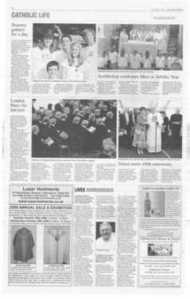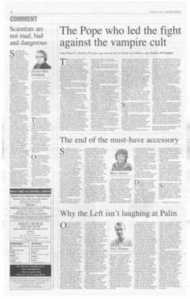Page 8, 10th October 2008
Page 8

Report an error
Noticed an error on this page?If you've noticed an error in this article please click here to report it.
Tags
Share
Related articles
The Restless Heart: The Life And Influence Of St...
The Bishop Who Knew The Glory And Misery Of Man
Augustine , Antidote To The Enlightenment
Saints And Scholars
Saint Augustine: The Two Men He Made One
How the flu led me to St Augustine
More books have been written about Augustine of Hippo than any other saint. His frank account of his early life in his Confessions, together with his philosophic writings, make him a fascinating person for writers to explore.
The few painters who have painted his likeness have usually portrayed him with a beard and writing. Botticelli's painting of him (without a beard) experiencing a mystical realisation together with his mother Monica is a little different although to me unappealing. I was interested when Pope John Paul II noticed that the famous French actor Gerard Depardieu, bore a distinct resemblance to the saint, especially his prominent nose, and suggested Depardieu made a film in which he would star as Augustine. Depardieu subsequently gave several readings of the saint's work as well as some lectures, not only in Christian venues but in mosques and synagogues in France. He became very involved with Augustine and commented that later parts of the Confessions "answer our most intimate doubts and calm our most painful selfquestioning".
Knowledge of Augustine always seems to have a lasting effect on people and after some reading and writing several articles I felt inspired, in my own humble way, to write a play. I came to Augustine of Hippo not through Christian reading but through working in Tunisia. Places where he was born, studied, taught and eventually became bishop have of course been under Arab rule since the eighth century so that they are unrecognisable by name except for Carthage. Thagaste has become Souk Ahras and Hippo Regius is Annaba. Algerians and Tunisians revere him as their great philosopher who happened to be a Christian in the early centuries when North Africa had a large and powerful Christian following. I was interested that Augustine was Berber with some Roman ancestry, with a pagan father and devout Catholic mother, Monica, although her zeal simply drove him in the opposite direction. More than anything I felt Augustine might be like some of the intellectual Tunisians I met.
It was Hortensius, a book by Cicero and adapted from Aristotle, that really inspired him and his friend Nebridius, a pagan by upbringing, to go in search of wisdom and truth. So for me he did not have the odour of sanctity that can get in the way of seeing a saint as a being with human emotions. The first book on Augustine I read was by Peter Brown and could not have been better for giving an all-round picture of him and his contemporaries and life in north Africa at that time. Here was a real warm-blooded student at Carthage University, ambitious to become a great orator and later enter politics. a great lover of the literature of Virgil and Cicero, crazy about sex and shacked up with a low-class girl in Carthage with whom he stayed for 15 years and had a son. He was also curious about life, why people did things, and how could one attain wisdom. He still comes over after 1,500 years as incredibly sexual, emotional and alive.
I was lucky to have flu over one Christmas and was able to read a pile of passed-on review copies of new bookS on Augustine and a load of discarded books on early Church history. The more I read, the more his life, especially his wild youth, seemed to fit into naturally dramatic scenes, and just as teachers often encourage their class to act out a great event from history to better understand the situation, I always turned to drama to express what I had learned. I also knew a man, charming and brilliant and with other qualities, not always pleasant. that Augustine seemed to have had which helped put flesh on the character.
I scripted a play with short scenes where the natural drama was clear and persuaded my acting friends to take part in a rehearsed dramatised reading in a pub one Monday evening to see how interested people would be. Probably over half were spiritually inclined and practising Christians. Few knew anything about Augustine. It seemed to go genuinely well with laughter in the intended bits. A lady who was not into religion at all told me she had ordered a copy of the Confessions as she was really interested. Some people said there was too much talking in it and many were horrified at the way Augustine ditched his long-term love. Not the sort of behaviour you expect of a saint. I enjoyed this and the presumption of taking on such a gigantic subject did not occur to me then. It certainly did later. Initially it was a question of getting all the events covered in the drama, including the argument between Catholics and Donatists and against Pelagius.
As I moved on to mount a proper production and a professional director took over. namely Robin Marchal, vice-president of the Catholic Actors Guild, and the actors complained about "wordiness" and "theological indulgence", I had to dig even more deeply into his work (and indeed myself) to interpret truthfully his actions and motives. Just how much Was he putty in the hands of his mother? Did he return to the Catholic flock because he had examined every possible philosophic route and he was tired of searching? Did he give up his career as an orator because it was not going as well as he wanted and he had health problems? He could, after all, have achieved a lot for Christianity in the Senate. I also had to shape the play to make it theatrically acceptable and financially viable without changing the historic facts too much. Every day I asked: "How did I get into this thing which is too big for me?" But if you've started it, you have to finish it, don't you?
Gerard Depardieu felt that no film could do justice to St Augustine's language, which was Latin anyway, but many books in English have inspired ordinary readers to study his life and writing. I shall be very grateful for any comments, favourable or otherwise, from people who may come to see it.
Katy HounsellRobert
Augustine will be shown this Wednesday at Sr Peter 's Church, Petersfield, Hampshire, and next Friday at Sr Thomas's Anglican Cathedral, Portsmouth and the Catholic Cathedral the following day. Tickets cost £5 (concessions £350). For fiirther information phone 02392 837064 or visit wwwAugustineHippo .co .uk
blog comments powered by Disqus

















